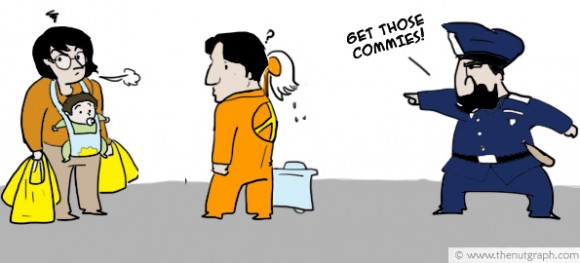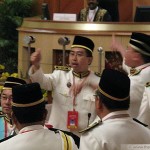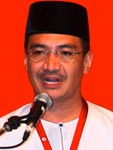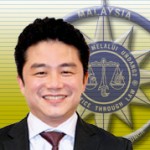
The “evils” of Bersih
“They were carrying items inciting the people to hate the government. This is serious and can threaten national security.”
“They include flyers and t-shirts with Chin Peng, Rashid Maidin and Suriani Abdullah — all connected to MCP (Malayan Communist Party) — written on them.”
Penang deputy police chief Datuk Abdul Rahim Jaafar, commenting on the arrests of 31 Parti Sosialis Malaysia (PSM) members on 25 June 2011. He accused the PSM members of attempting to use Bersih 2.0’s upcoming 9 July 2011 rally to rekindle communist ideology and distributing flyers deemed a threat to national security.
The 31, including Sungai Siput Member of Parliament Dr Michael Jeyakumar Devaraj, were remanded for seven days under Section 122 of the Penal Code for waging war on the Yang diPertuan Agong. Jeyakumar and five other PSM members were re-arrested upon their release on 2 July under the Emergency Ordinance (Public Order and Prevention of Crime) 1969 which allows for detention without trial. Meanwhile, PSM chairperson Dr Nasir Hashim has refuted the allegations as “absolute nonsense” and “a piece of the madness that has taken hold of the force lately”. (Source: Police: PSM activists trying to rekindle communist ideology, The Star, 26 June 2011)
“Intelligence gathered has revealed attempts by certain quarters, including foreign elements, attempting to seize the opportunity and exploit the situation.
“There is a possibility that should the rally proceed, it could create chaos, destruction to property, injuries and even the possibility of loss of lives.”
Inspector-General of Police Tan Sri Ismail Omar, warning that foreign elements are out to create chaos at the upcoming Bersih 2.0 rally. He vowed that the police would go all out to prevent the rally from being held.
Ismail said police have arrested 101 people across the country for inciting the public to join the rally and that 1,830 police reports had been made against it. (Source: Police to use all available laws to prevent July 9 demonstrations, The Star, 30 June 2011)
“If the Bersih T-shirt is related to an illegal activity, then whatever they are wearing is illegal.”
Home Minister Datuk Seri Hishammuddin Hussein, justifying the detention of those wearing Bersih 2.0 t-shirts.

Parti Keadilan Rakyat assemblyperson Chang Lih Kang, who had been arrested in a Bersih t-shirt, tweeted that police had informed him that wearing the yellow T-shirt instigated others to attend the Bersih rally. (Source: Hisham declares Bersih T-shirt illegal, Malaysiakini, 29 June 2011)
“Action will be taken against anyone found wearing the yellow attire, or driving cars, and buses with the Bersih 2.0 logo to incite people to attend the rallies.”
Ismail, saying stern action will be taken within the confines of the law against anyone that plans to organise or participate in illegal gatherings. (Source: Police to use all available laws to prevent July 9 demonstrations, The Star, 30 June 2011)
“It seems like the parties planning the July 9 rally are desperate, and they think this is their time to stir up dissent and seize power.
“Those who are sane, have a family, educated, have business and other interests should rise against this evil and illegal programme.”

Information, Communications and Culture Minister Datuk Seri Dr Rais Yatim claimed that the Bersih 2.0 rally is a plot by the organisers to “seize power”.
In the same report, Hishammuddin also accused Bersih 2.0 of playing up political and racial issues and had other motives apart from calling for a clean and fair election. (Source: Hisham: Bersih has gone off course, The New Straits Times, 28 June 2011)
“I think their intention is not good. (Bersih 2.0 chairperson Datuk S) Ambiga is their so-called leader. But I know that behind her is the opposition as (PAS deputy president) Mohamed Sabu has been made (Bersih) deputy chairman.”
Deputy Prime Minister Tan Sri Muhyiddin Yassin claimed that the Bersih 2.0 rally is a ploy by Pakatan Rakyat, hiding behind civil societies, to seize power by creating public dissent against the ruling government. (Source: Opposition using street demonstration as shortcut to Putrajaya, says Muhyiddin, Bernama, 18 June 2011)
“It does not matter if it is Bersih, Perkasa or Umno Youth — anyone who is found to be a threat to national security can be detained under the ISA.”
“For the time being, other laws can be utilised. We have not reached that level yet. We will monitor the situation.”
Hishammuddin, saying that the Home Ministry had not ruled out detaining those involved in the Bersih 2.0 rally under the Internal Security Act, which allows for detention without trial.
Umno Youth and Perkasa also plan to hold rallies on 9 July 2011. (Source: Hisham: ISA may be used against organisers, New Straits Times, 26 June 2011)
The right to peaceable assembly
“It should be recalled that it was Umno, led by Dato’ Onn Jaafar, then President of Umno and the grandfather of our present Minister for Home Affairs, which led the public to the streets nationwide to protest the setting up of the Malayan Union.
“Subsequent Umno leaders have also led street demonstrations, for example to call for independence, and those in support of the Palestinians…Those who say that street protests are not a part of our culture are clearly ignorant of our nation’s rich history.”

Bar Council president Lim Chee Wee, reminding politicians that public rallies have been “a part and parcel of our history” to protest against injustices.
Lim also pointed out that the right to assemble and walk in support of a cause is enshrined in the Universal Declaration of Human Rights, which Malaysia embraced and accepted when it was admitted to the United Nations in 1963. It is also protected in Article 10 of the Federal Constitution. (Source: Respect the right for a clean and peaceful walk, The Malaysian Bar, 23 June 2011)
“The [Human Rights Commission of Malaysia (Suhakam)] calls on the authorities to allow the planned peaceful assemblies to be held, and on the parties intending to hold these assemblies to exercise their rights in a peaceful and responsible manner.”

Suhakam chairperson Tan Sri Hasmy Agam urged the authorities to respect the people’s right to peaceful assembly. The commission also reiterated its recommendation to the government to repeal certain sections of the Police Act that restricts the public’s right to peaceful assembly.
Hasmy said Suhakam would also monitor the rallies. (Source: The right to hold peaceful assemblies must be protected, Suhakam, 28 June 2011)
“Subject to clauses (2), (3) and (4) –
(a) every citizen has the right to freedom of speech and expression;
(b) all citizens have the right to assemble peaceably and without arms;
(c) all citizens have the right to form associations.”
Article of the Malaysian Federal Constitution that guarantees the right to assembly peaceably and without arms. (Source: Federal Constitution, Article 10) ![]()
[related-posts]


Abuhamid says
Quote:”Article 10 of the Federal Constitution guarantees the right of every citizen to assemble peacefully and without arms” with a police permit me thinks and do those people-manipulators have that?
neptunian says
Hello, as I recall, Perkasa and Umno Youth […] have had about four “gatherings” to harrass and threaten PKR and Bersih people in the last three / four weeks. Wonder if they have “police permits”?
I believe Malaysians in general […] are educated enough to see the obvious lob-sidedness in the administration of “justice”.
Andrew I says
Well, the commentators at the Star seem to have missed it.
Kong Kek Kuat says
@ Andrew I
The commentators at The Star have their “Datuk Seri” and “Datuk” pangkat to protect. Or maybe it´s the other way around — they have their human masters to protect and hence their pangkat.
Utusan Malaise says
Must vote out […] Umno in GE November 2011 !!!
Andrew I says
No banana day.
orang banyak lama says
This is the result after 55 years of the NEP. The Malay psyche is been severely compromised. It has become unable to be rational, intellectual and broad minded. It has become racist, spoiled and lazy, unable to take on the other races, let alone the world.
After 55 years, the Malays see others going ahead, so they try to limit the non-Malays from moving forward too. Such bigoted attitudes will do the Malays more harm. The required backtracking is hard to do.
How many Malays will want to give up the NEP? The NEP gives them everything they want in life without having to work for it. Somehow or other they will still want the NEP, and somehow or other, they will become worse and worse. It is a vicious cycle that only the Malays can break. Who will step forward to lead this rejuvenation?
Merah Silu says
Do not be too arrogant about the Malays. They have been very successful in many aspects, including in the education sector. There are sizable Malay intellectuals who can steer this country into new heights and prosperity. Their problem is the presence of a large number of descendants of economic-seeking immigrants, who are the remnants of British colonisation. They fail to integrate with the locals, and would like to continue with their alien culture: corruption, prostitution, gangsterism, etc.
To achieve their goal of controlling the Malays, they are now using the tactic of condemning any Malay institutions, and to break the unity of Malays. With their strong economic power, they manage to buy and persuade Malay political parties to fight to each other. Look at the chaos during the Bersih rally, 90% are Malays who like to have festivals without realising the agenda behind this rally.
NEP will continue to reflect the ketuanan Melayu in this country. If these descendents are not happy, they are free to migrate to other countries. The Malays can only live happily in this country when they get independent in the real sense.
Munsyi says
It is not free and fair elections that Ambiga and the opposition parties are fighting for in Bersih 2.0 rallies. They needed the rally to fan the anti-government sentiments on the ground. They were hoping for the repeat of the success of the Bersih in 2007 but fell flat. It was different back then. At that time the government was hugely unpopular. You can feel it on the street.
If fair elections is what they were fighting for, it is the same electoral roll that put the opposition into power in five states, deny the BN its two-thirds majority and deal a huge blow to its confidence and credibility in the upcoming elections. The 2008 election was the worst for BN since Independence. If that is ‘dirty’ according to Ambiga and her friends, then what is the definition of “clean and fair elections” according to Bersih? That all seats must be won by the PKR, PAS and DAP?
The opposition must realise the momentum is not on their side anymore. The tide is already turning in a different direction. You could see the trend in the previous by-elections and Sarawak elections. The only party with a solid performance is DAP, with promising prospects in the next GE; but as for the other two, maybe they should count their days in power. Except, perhaps, PAS in Kelantan.
hm says
Bersih is politics – thinly veiled, but politics nonetheless.
1. Clean the electoral roll
The electoral roll is marred with irregularities such as deceased persons and multiple persons registered under a single address or nonexistent addresses. The electoral roll must be revised and updated to wipe out these ‘phantom voters’. The rakyat has a right to an electoral roll that is an accurate reflection of the voting population. In the longer term, Bersih 2.0 also calls for the EC to implement an automated voter registration system upon eligibility to reduce irregularities.
RESPONSE:
Based on the CIA World Fact book, death in Malaysia is 4.93 per 1,000 population (based on July 2011). Through extrapolation, for a 28 million population, the estimated number of deaths in a year is 138,040 persons. Assuming the information is not updated in JPN over a period of 5 years, in a worst-case scenario, the total “un-updated record of deceased persons” is 690,020 people.
According to the EC, we have 11.4 million registered voters. Assuming EC did not update their database due deceased people, this represents 6% inaccuracy of the true / actual registered voters.
Malaysians should ask: can a 6% “inaccuracy / irregularity” (in a worst-case scenario) be a strong point to bash the EC or the government for being unfair? I think this is absurd and politically motivated.
The fact that the opposition won more states in the next GE showed that fair election / democracy is in place.
Therefore, my question for those who are politically inclined: does the 6% translate into a sure win for the the political parties (including opposition) in the next GE?
[…]
hm says
2. Reform postal ballot
The current postal ballot system must be reformed to ensure that all citizens of Malaysia are able to exercise their right to vote. Postal ballot should not only be open for all Malaysian citizens living abroad, but also for those within the country who cannot be physically present in their voting constituency on polling day. Police, military and civil servants too must vote normally like other voters if not on duty on polling day.
The postal ballot system must be transparent. Party agents should be allowed to monitor the entire process of postal voting.
RESPONSE:
According to the government website, Malaysia has approximately 1.2 million civil servants. The police and military are consistently on duty and geographically dispersed throughout the country. In fact, they are on duty too during elections, etc.
If the police, military are forced to vote normally, then they are forced to leave their duty in various locations. Imagine leaving the jungle, strategic border locations just to vote. I think this is not practical at all.
On this note, Bersih 2.0 also made a proposal to EC for party agents to monitor the entire process of postal voting. Well, this has not happened in any other countries. Please name me one country which allows parties on both divide to “intervene” in the EC processes or postal voting.
Also, postal voting happens not only for police and military personnel who are on duty, but also Malaysians who vote overseas. If Bersih 2.0 wants party agents to be allowed to monitor the entire process of postal voting, does that mean that party agents need to be posted whenever and wherever there are Malaysians voting overseas? (I’m sure some of them don’t mind having the excuse to have a nice holiday overseas, “in the name of democracy”!)
I think this proposal suggests deep paranoia and mistrust of key institutions in the country, including the Election Commission, which I think is simply pathetic.